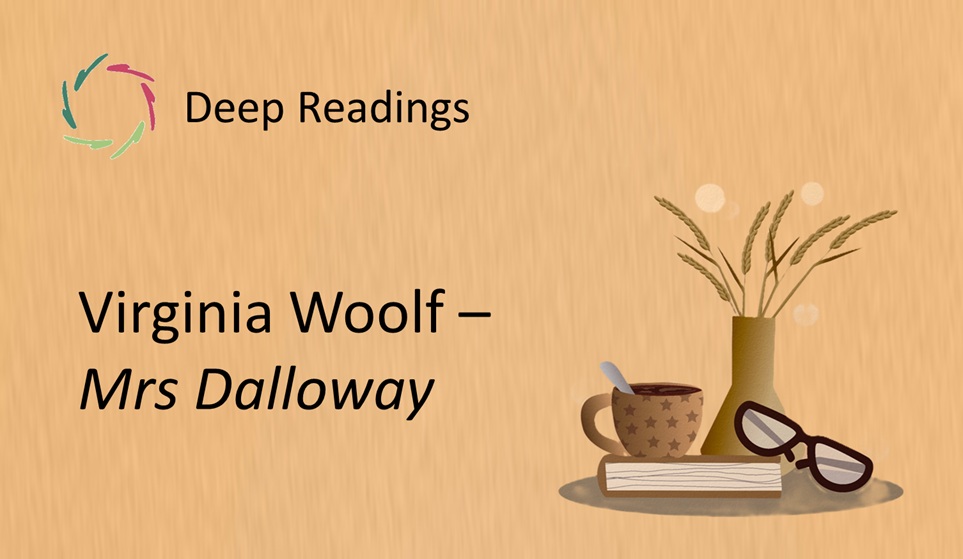Deep Readings: Virginia Woolf – Mrs Dalloway

The Fragment
“Mrs. Dalloway said she would buy the flowers herself.
For Lucy had her work cut out for her. The doors would be taken off their hinges; Rumpelmayer’s men were coming. And then, thought Clarissa Dalloway, what a morning — fresh as if issued to children on a beach. What a lark! What a plunge! For so it had always seemed to her, when, with a little squeak of the hinges, which she could hear now, she had burst open the French windows and plunged at Bourton into the open air. How fresh, how calm, stiller than this of course, the air was in the early morning; like the flap of a wave; the kiss of a wave; chill and sharp and yet (for a girl of eighteen as she then was) solemn, feeling as she did, standing there at the open window, that something awful was about to happen.”
Read more → Project Gutenberg Australia
Contextual Glimpse
Published in 1925, Mrs Dalloway is Virginia Woolf’s great modernist experiment with consciousness and time. The novel unfolds over a single day in London, interweaving memories and present moments. From the very first line, Woolf sets the tone: not with a grand event, but with a small, domestic decision — buying flowers. Yet within this everyday moment opens a flood of sensations, memories, and anticipations. The ordinary becomes luminous, alive with echoes of youth and intimations of mortality.
Resonance
Clarissa’s plunge into the fresh morning air is more than a memory — it is a metaphor for life itself. What seems ordinary — a door opening, air rushing in — becomes charged with awe, as if “something awful” (in its older sense of awe‑full, filled with magnitude) is always about to happen. Woolf shows us that daily gestures can hold the weight of destiny.
Why this may also be about you
Woolf’s prose is not only about Clarissa walking through London on a single day. It is also about how each of us carries entire worlds of memory, hope, and pain within ordinary moments. The fragment reveals how life unfolds in delicate, fleeting perceptions — a face glimpsed, a sound remembered, a thought returning like a tide.
You too know this layering: the past rising unbidden while the present keeps moving forward. Woolf shows that existence is not linear but shimmering, woven from countless impressions. To recognize this is to see your own days differently — not as a march of hours, but as a sea of inner lights.
Lisa’s inspired, original idea about this fragment
Perhaps Woolf suggests that consciousness itself is a kind of artistry. Each perception, memory, or thought is like a brushstroke, small on its own but luminous in combination. We do not need to create a masterpiece outside ourselves; we are already painting one within.
In this sense, the fragment is also about dignity. To honor your own stream of thought is to honor your being. Woolf invites us to regard the overlooked — a passing sensation, a flicker of feeling — as part of the great canvas of a life.
Echoes
Since its publication in 1925, Mrs Dalloway has echoed through literature, influencing modernist and postmodernist writers alike. Its stream‑of‑consciousness technique became a hallmark of 20th‑century fiction, inspiring James Joyce, William Faulkner, and many others. The novel’s voice reverberates especially in works that foreground interiority, capturing the hidden texture of daily life.
Beyond literature, Woolf’s vision has entered cultural memory. The very phrase “Mrs Dalloway” evokes the inner lives beneath ordinary surfaces. Her influence echoes in psychology, feminist thought, and art forms seeking to portray subjective reality. The novel lives on as a mirror showing us that every mind is a vast, echoing chamber — worth listening to.
Inner Invitation
Close your eyes and imagine opening a door on a fresh morning. Feel the air on your skin. Sense both calmness and a faint tremor, as if something vast is waiting just beyond. Let yourself rest in that in‑between space: not yet inside, not fully outside, but on the threshold. What door in your own life is waiting to be opened today?
Closing Note
Woolf’s fragment reminds us that the most delicate gestures — buying flowers, opening a window — can reveal the whole of life shimmering beneath them.
Lisa’s final take
Silence is the true inhabitant of rooms.
Keywords
ordinary, memory, youth, threshold, morning, awe, present moment, time, perception, mortality, possibility


